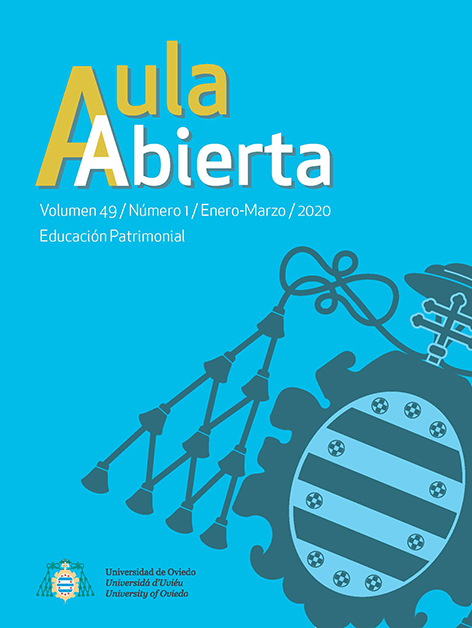Abstract
Heritage education has been established in our country as a scientific discipline in the last decades, confirming the concern in heritage and education matters by the State with the implementation of the Educational and Heritage National Plan. The Community of Madrid took the helm and is developing the Heritage Education Plan, designing actions and educational products adjusted to social needs. To know the starting point on which this plan may be developed, the present study is carried out to analyse the social perceptions about the heritage of the Community of Madrid. To achieve this, a semi-structured interview is designed including sociodemographic variables and variables related to perception such as heritage typology, motivation or accessibility to heritage. A sample of 122 individuals are interviewed within the XI Bienal Ibérica de Patrimonio Cultural (AR&PA) framework. Results obtained show that individuals greatly disagree with accessibility to heritage and own a tangible perception of heritage, being immaterial heritage secondary. This results imply a road map on which organizations responsible for heritage education should design more specific, precise and systematized actions that are suitable to the social needs of their population.
Keywords: Heritage Education; Identity; Plan; Social Perception; Awareness.
1
References
Cepeda, J., y Fontal, O. (2019). Diseño de una encuesta para identificar las formas de relación identitaria en Castilla y León. Revista Electrónica Interuniversitaria de Formación del Profesorado, 22(1), 29-40.
Copeland, T. (2006). European democratic citizenship, heritage education and identity. Strasbourg, France: Council of Europe.
Council of Europe. (1983). Bremen Declaration. New response for cultural problems Council of Europe Framework Convention on the Value of Cultural Heritage for Society (CPL/CCC (83) 11-E). Retrieved from https://rm.coe.int/CoERMPublicCommonSearchServices/DisplayDCTMContent?documentId=09000016806b23f4.
Council of Europe. (2005). Council of Europe Framework Convention on the Value of Cultural Heritage for Society (Faro, 27.X.2005). Council of Europe Treaty Series, 199. Retrieved from http://conventions.coe.int/Treaty/EN/Treaties/Html/199.htm.
Domingo, M., Fontal, O., y Ballesteros, P. (Coords.). (2013). Plan Nacional de Educación y Patrimonio. Madrid: Ministerio de Educación, Cultura y Deporte, Secretaría de Estado de Cultura.
Fontal, O. (2003). La Educación Patrimonial. Teoría y práctica en el aula, el museo e internet. Gijón: Trea.
Fontal, O., e Ibáñez-Etxeberria, A. (2017). La investigación en Educación Patrimonial. Evolución y estado1 actual a través del análisis de indicadores de alto impacto. Revista de Educación, 375(1), 84-214.
Fontal, O., Ibáñez, A., Martínez, M. y Rivero, P. (2017). Heritage as content in Primary Education: From the Curriculum to Teacher Education. Revista Electrónica Interuniversitaria de Formación del Profesorado, 20(2), 79-95.
http://dx.doi.org/10.6018/reifop.20.1.286321.
Fontal, O., y Martínez M. (2017). Evaluación de programas educativos sobre Patrimonio Cultural Inmaterial. Estudios Pedagógicos, 43(4), 69-89. http://dx.doi.org/10.4067/S0718-07052017000400004
Fontal, O., y Marín, S. (2018). Inclusive heritage: towards an index for the evaluation of educational inclusion to heritage. CADMO, 44, 117-120.
Llull, J. (2005). Evolución del concepto y de la significación social del patrimonio cultural. Arte, Individuo y Sociedad, 17, 175-204.
Lobovikov-Katz, A. (2009). Heritage Education for Heritage Conservation. A Teaching Approach, Strain, 45(1), 480-484. https://doi.org/10.1111/j.1475-1305.2008.00569.x
López-Noguero, F. (2002). El análisis de contenido como método de investigación. XXI Revista de Educación, 4(1), 167-179.
Matarasso, F. y Landry, C. (1999). Balancing act: twenty-one strategic dilemmas in cultural policy. Strasbourg: Council of Europe.
Matthews, R., Hussain, O., Palmero, M., Fobbe, S., Nováček, K., Mohammed-Amin, R… Richardson, A. (2019). Heritage and cultural healing: Iraq in a post-Daesh era. International Journal of Heritage Studies. https://doi.org/10.1080/13527258.2019.1608585
Morate, G. (2007). Conocimiento y percepción del patrimonio histórico en la sociedad española. Revista electrónica de patrimonio histórico, 1, 1-10.
Ortiz, P., et al. (2018). The Hidden Face of Cultural Heritage: a science window for the dissemination of elementary knowledge of risk and vulnerability in cultural heritage. Heritage Science, 60, 2-15. https://doi.org/10.1186/s40494-018-0224-z
Rivero, P., Fontal, O., Martínez, M., y García-Ceballos, S. (2018). La educación patrimonial y el patrimonio arqueológico para la enseñanza de la Historia: el caso de Bílbilis. Ensayos. Revista de la Facultad de Educación de Albacete, 33(1), 23-37. http://www.revista.uclm.es/index.php/ensayos
Teixeira, S. (2006). Educación patrimonial: alfabetización cultural para la ciudadanía. Estudios Pedagógicos, 32, 133-145.
UNESCO. (1972). Convention for the Protection of the World Cultural and Natural Heritage. Paris: UNESCO. Recuperado de https://whc.unesco.org/document/163850
UNESCO. (2005). Convention on the Protection and Promotion of the Diversity of Cultural Expressions. Paris: UNESCO. Recuperado de http://unesdoc.unesco.org/images/0014/001429/142919e.pdf
UNESCO. (2014). Managing Cultural World Heritage. Paris: UNESCO. Recuperado de https://whc.unesco.org/en/managing-cultural-world-heritage/





